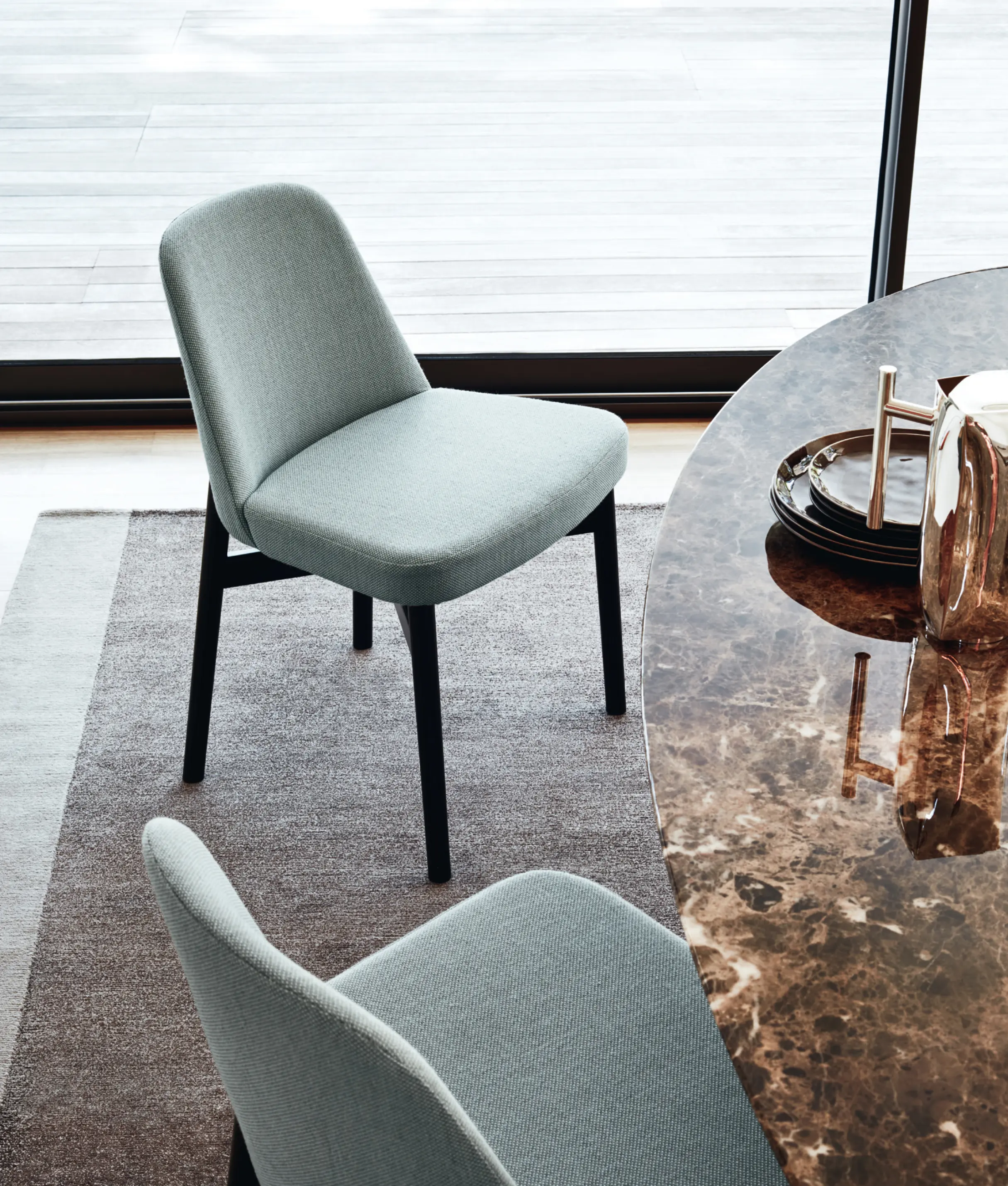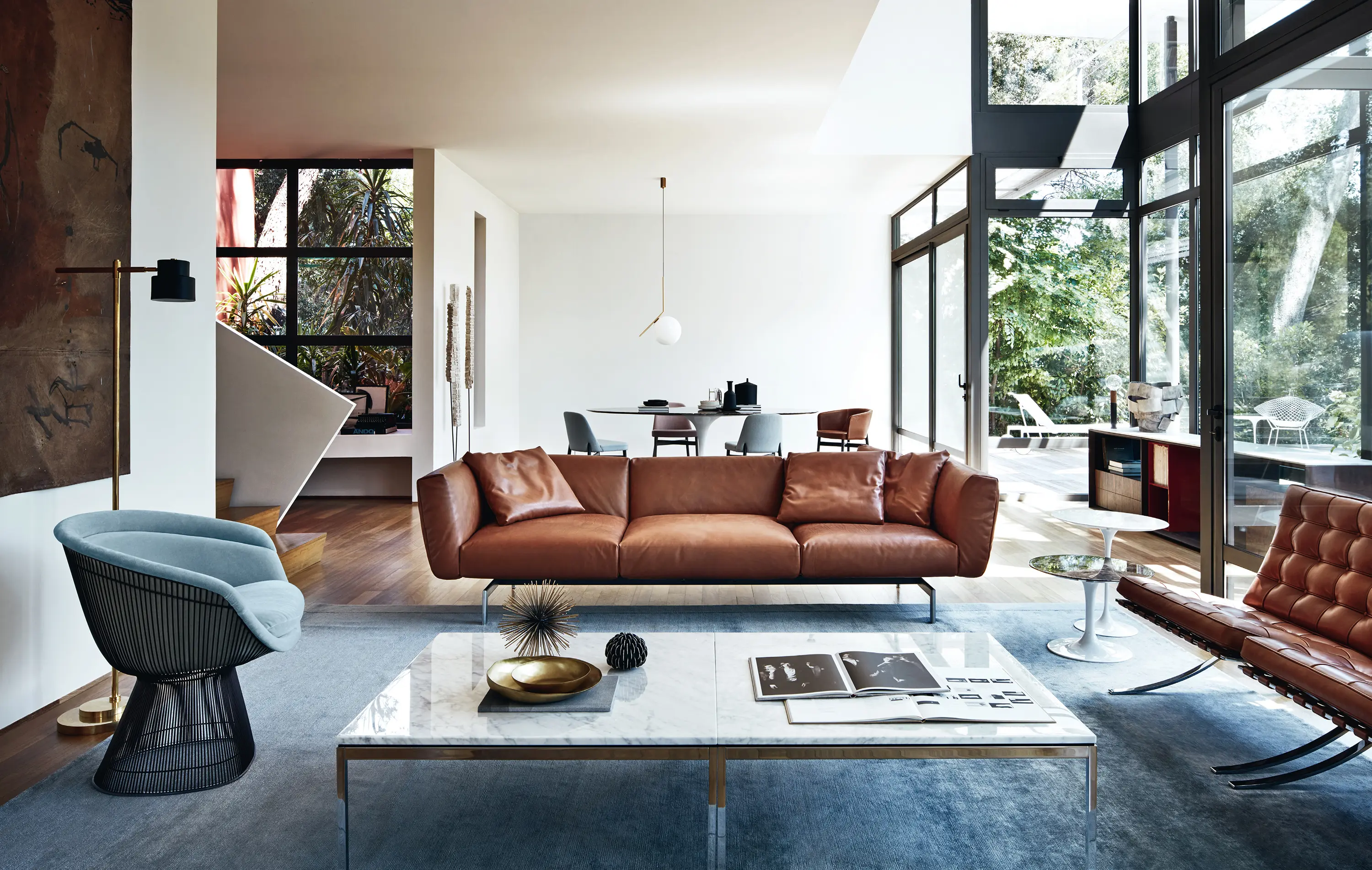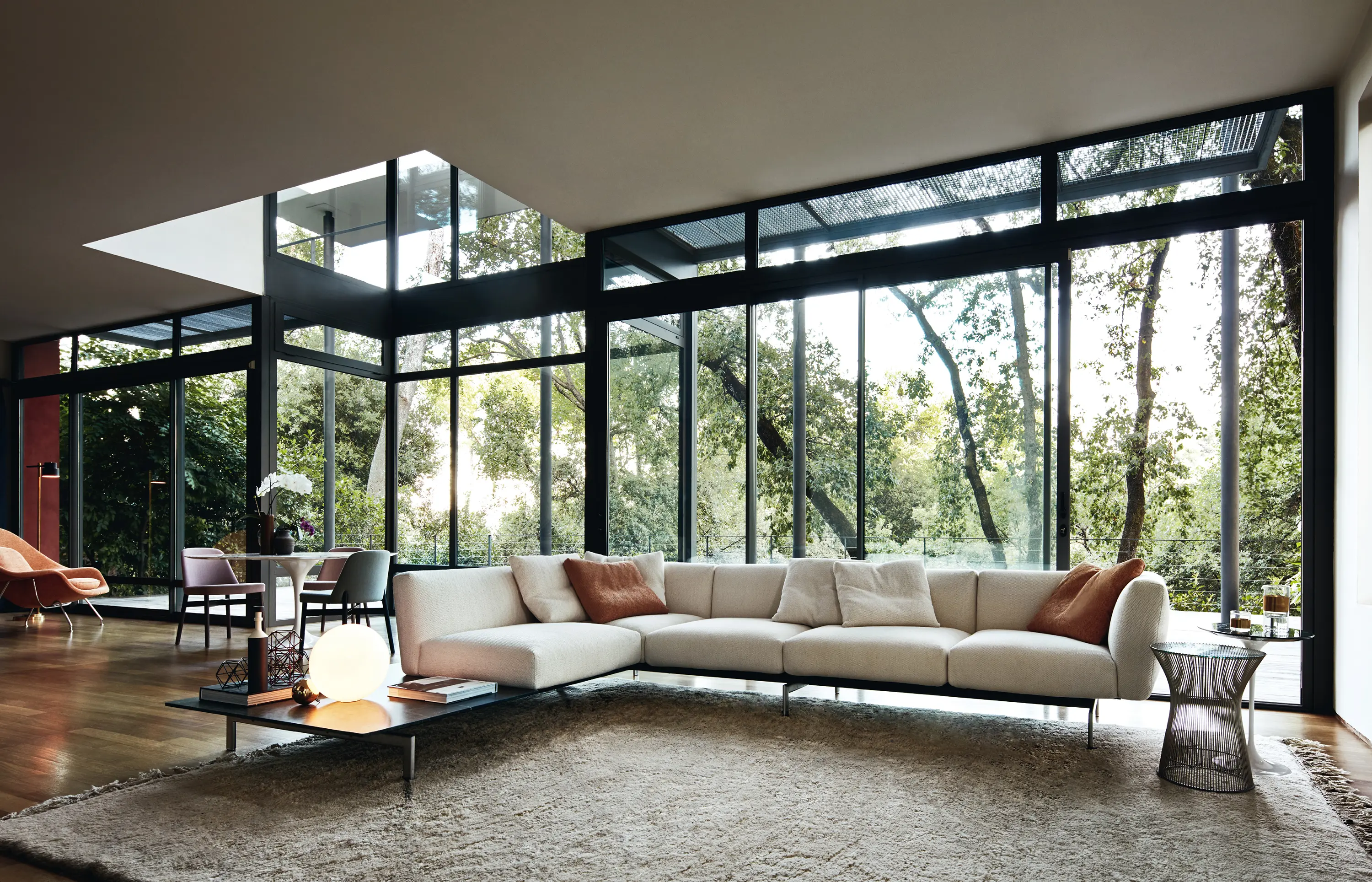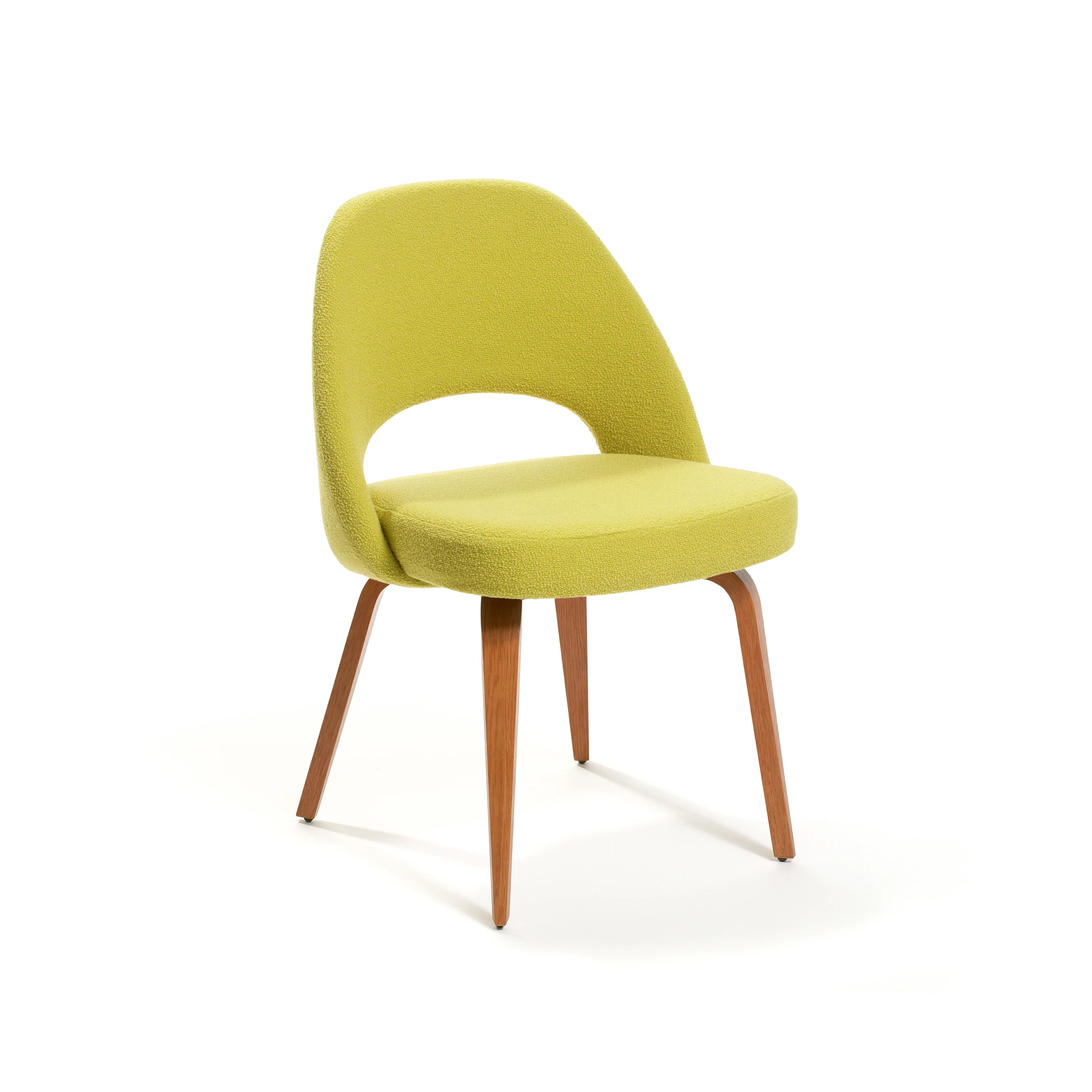ABOUT US Founded in 1938, Knoll is a global manufacturer of office furnishings dedicated to design excellence. We are committed to offering customers elegantly designed products for office and residential use. Recognised worldwide as a design leader, Knoll is the recipient of hundreds of design awards, with products represented in major art museums around the world. We are especially proud to have more than 30 products included in the Design Collection of The Museum of Modern Art in New York City. Our KnollStudio collection of modern classics comprises seating, tables and desks for executive offices and distinguished homes. Developed in collaboration with the world’s leading architects and designers, KnollStudio represents exquisitely designed signature pieces that embody elegance, craftsmanship and emblematic detail. The Knoll office product line includes office systems, office seating, wood desks, metal desks and files, office accessories, fabrics and leathers. Our design philosophy is firmly rooted in the needs of our customers. We combine solid workplace research with innovative thinking to create distinctive, high-performance workplaces that address the unique and ever-changing needs of businesses. Knoll has locations around the world. In Europe, Knoll is represented by showrooms and dealers in all major cities. In North America, we serve clients through a network of more than 300 dealerships supported by 100 showrooms and regional offices. Throughout Latin America and Asia, Knoll clients are served by independently owned licensees. Knoll has manufacturing sites in Foligno and Graffignana, Italy; East Greenville, PA; Grand Rapids and Muskegon, MI; and Toronto, ON. Knoll is distinguished as the first major office furnishings manufacturer to be awarded ISO 9000 and ISO 14001 registration worldwide. In Europe, Knoll is registered in ISO 9001/2000. In North America, Knoll is registered in ISO 9001.
En savoir plusCollections
Voir toutes les collectionsProduits en vedette
Voir tous les produitsCatalogues
Voir tous les catalogues
Contemporary Collections Vol.2
en • de • it • fr • 2024

Classic Collections Vol. 1
en • de • it • fr • 2024

Outdoor Collection
en • de • it • fr • 2023
Point fort du projet
Voir tous les projets
Leeton Pointon Architects + Interiors
2023
Melbourne
En savoir plus sur Knoll International
Voir toutes les histoiresÀ propos de Knoll International



ABOUT US
Founded in 1938, Knoll is a global manufacturer of office furnishings dedicated to design excellence.
We are committed to offering customers elegantly designed products for office and residential use.
Recognised worldwide as a design leader, Knoll is the recipient of hundreds of design awards, with products represented in major art museums around the world.
We are especially proud to have more than 30 products included in the Design Collection of The Museum of Modern Art in New York City.
Our KnollStudio collection of modern classics comprises seating, tables and desks for executive offices and distinguished homes.
Developed in collaboration with the world’s leading architects and designers, KnollStudio represents exquisitely designed signature pieces that embody elegance, craftsmanship and emblematic detail.
The Knoll office product line includes office systems, office seating, wood desks, metal desks and files, office accessories, fabrics and leathers.
Our design philosophy is firmly rooted in the needs of our customers.
We combine solid workplace research with innovative thinking to create distinctive, high-performance workplaces that address the unique and ever-changing needs of businesses.
Knoll has locations around the world. In Europe, Knoll is represented by showrooms and dealers in all major cities. In North America, we serve clients through a network of more than 300 dealerships supported by 100 showrooms and regional offices.
Throughout Latin America and Asia, Knoll clients are served by independently owned licensees. Knoll has manufacturing sites in Foligno and Graffignana, Italy; East Greenville, PA; Grand Rapids and Muskegon, MI; and Toronto, ON.
Knoll is distinguished as the first major office furnishings manufacturer to be awarded ISO 9000 and ISO 14001 registration worldwide. In Europe, Knoll is registered in ISO 9001/2000. In North America, Knoll is registered in ISO 9001.
HISTORY
Knoll was founded in 1938 by Hans G. Knoll, a German immigrant to the U.S., and son of one of Germany’s pioneer manufacturers of modern furniture. Educated in England and Switzerland, Hans Knoll was familiar with the Bauhaus and with many of the seminal figures in twentieth century design and architecture, including Walter Gropius, Marcel Breuer and Ludwig Mies van der Rohe.
Hans Knoll arrived in New York City in 1937 and, in the following year, in a single second-story room on East 72nd Street, established the Hans G. Knoll Furniture Company, bravely nailing up a sign which read: Factory No. 1.
Like many visionaries, his business objective today seems simplistic: that modern architects would need modern furnishings.
During World War II, Hans Knoll met and hired a young space planner and designer named Florence Schust. Florence Schust came to Knoll with impressive credentials. She had graduate degrees from the Cranbrook Academy in Michigan, a degree in architecture from the Architectural Association in London, had studied with Mies van der Rohe at the Armour Institute in Chicago, and had worked in the architectural offices from Gropius and Breuer in Boston.
In 1946, Florence Schust and Hans Knoll married and formed Knoll Associates. From the initiation of their partnership, Florence played a critical role in the development and direction of the company. It was her concept to take a Bauhaus approach to furniture design: to offer objects that represented design excellence, technological innovation and mass production. Together, Hans and Florence Knoll searched for and nurtured talented designers; they believed strongly that designers should be credited by name and paid royalties for their work, a tradition which continues at Knoll today.
With the extensive European and American design contacts of Florence and Hans, the company’s products took on an international flavour. They brought in architects Eero Saarinen and Franco Albini, and worked with artists such as Harry Bertoia, Jens Risom and Isamu Noguchi to develop a collection of furnishings that are now widely recognised as classics in the pantheon of modern design. Later, Knoll acquired the exclusive rights to the Barcelona, MR and Brno Collections by Mies van der Rohe and the Wassily Chair by Breuer, and began manufacturing these classics to the exacting specifications of the original designs.
In 1947, Knoll opened a showroom devoted entirely to textiles, and announced the creation of a textiles division. The New York Times described it as representing, “half a dozen of the most talented designers of this country and Europe.” The original collection was heavily influenced by men’s suiting fabrics; Florence Knoll, despairing of the lack of good-quality upholstery materials, had looked toward the fashion industry to find mills that would produce innovative fabrics for Knoll furniture. Also represented in the early textiles collection were striking fabrics derived from the craft of weaving, adapted for the first time for mass-manufacture on machine looms.
By the end of the war, Hans Knoll had begun to think about developing a base of furniture manufacturing outside New York City. A stickler for quality and an excellent business manager, he was attracted to eastern Pennsylvania, with its large population of German-Americans. Not only did the area have a tradition of meticulous craftsmanship, but young men returning from war and no longer wanting to be farmers meant a good potential labour supply. Knoll’s first purchase was a former planing mill in Pennsburg, near Quakertown. In the early 1950s, the company bought a building in nearby East Greenville. Today, East Greenville is the headquarters of Knoll and the site of the company’s largest manufacturing facility.
Of all the design activities that took place at Knoll Associates, some of the most vital and with far-reaching effects were achieved by the Planning Unit, an internal department which worked with clients to identify their workplace needs and to develop interior architecture and furnishing solutions. This integrated approach pioneered by Knoll Planning Unit is widely recognized as the model for today’s approach to corporate interior design. Architects and business executives alike recognized the value of this approach. During this time Florence Knoll stated affirmatively that “Good design is good business,” a credo that became the company’s anthem.
After Hans Knoll’s untimely death in an automobile accident in 1955, Florence Knoll assumed the role of president, a position she held until 1960 when she became a consultant. In 1965, she withdrew from the industry completely, leaving Knoll it in the hands of those she had trained and inspired.
Today, Knoll is committed to continuing the legacy of design excellence established by Hans and Florence Knoll. We continue to work with the world’s most renowned designers to develop classic, modern designs that look fresh, never dated. We continue to work closely with our customers to help them use workplace design to meet their individual business needs. And we continue to believe that “Good design is good business.”
MANUFACTURING
Knoll Europe have plants in Foligno and Graffignana, Italy.
Foligno.
Via delle industrie 1, Foligno, Italy
Our Foligno specializes in timber-based production and upholstery, including the more craft orientated production processes for our historic Studio products.
Graffignana
Via S. Colombano 67, Graffignana, Italy
The Graffignana plant specializes in steel fabrication and finishing, primarily for systems products.
Within each facility, the manufacturing processes are assessed separately. Specific environmental control and waste disposal practices are created to suit.
We also operate four manufacturing sites in North America: East Greenville, Pennsylvania; Grand Rapids and Muskegon, Michigan; and Toronto, Ontario. All Knoll manufacturing facilities are ISO 14001-certified, an important mark of commitment to environmentally responsible practices
Sustainable Design
Knoll is a leader in policies and practices designed to protect the biosphere, conserve natural resources and reduce waste. We are committed to helping safeguard all natural habitats and local communities. We strive to make the most efficient and responsible use of renewable resources, including water, soil and forests, and to conserve natural resources. We are pioneers in Clean Technology. Our commitment to high environmental standards is mandated by a comprehensive Environmental, Health & Safety Management Plan.
Worldwide, our initiatives and accreditations include:
FSC
Chicago climate exchange
ISO 14001
Greenguard
LEED
PHILOSOPHY
A Commitment to Modern Design
Since our founding in 1938, design integrity has been our guiding principle as we offer insight into the way business is changing and into what’s possible, now and for the future.
We believe good design is good business. Our commitment to modern design has yielded a comprehensive portfolio of furniture products and textiles designed to provide enduring value and help clients shape their workspaces with imagination and vision.
We are recognised as a design leader worldwide. Our products are exhibited in major art museums, with more than 40 pieces in the permanent Design Collection of The Museum of Modern Art in New York.
An Understanding of the Modern Workplace
At Knoll, we watch how the modern office is evolving, and we make furniture that responds and adapts to changing needs. We're thinking about the emergence of a new workplace climate, the meaning of new workplace planning models and how ecological principles inform our product designs. We engage in research activities, including independent field studies; collaborations with customers, universities and industry associations; and ongoing dialogue with experts from the fields of technology, architecture, design, organizational behavior, psychology and business management.

















